Tuesday, March 8, 2022
GITTLER PRIZE

Tuesday, March 8, 2022
GITTLER PRIZE
■ Carol Anderson is an award winning author and a prominent scholar of African American studies.
By ISABEL ROSETH JUSTICE STAFF WRITER
On Feb. 1, 2022, the University named African American studies scholar Carol Anderson as the 2022 winner of the Joseph B. and Toby Gittler Prize. The prize honors “outstanding and lasting scholarly contributions to racial, ethnic and/or religious relations,” according to the University website. The recipients, named annually, receive $25,000 and a medal, both of which are presented at a ceremony to honor the winner. Recipients also have a residency at the University; Anderson’s will take
place from Oct. 24 to Oct. 26, 2022.
Anderson won the award for her prominent work in African American studies. “Carol Anderson has produced seminal scholarship that not only explains how structural racism shapes life, policy, and politics in America but also demands the action necessary to bring about a better future for us all,” President Liebowitz said in a Feb. 1 BrandeisNOW article.
Anderson earned a Ph.D. in history from the Ohio State University in 1995 and is currently the Charles Howard Candler professor of African American studies at Emory University. She is a W.E.B. Du Bois Fellow of the American Academy of Political and Social Sciences, was elected into the American Academy of Arts and Sciences, and was elected into the Society of American Historians.
With the recent reduction in positive rates on campus, the University has implemented changes to COVID-19 regulations on campus, including making masks not mandatory in many locations and reducing testing frequency.
On March 3, Carol A. Fierke, provost and executive vice president for academic affairs, Stew Uretsky, executive vice president for finance and administration, and Raymond Lu-Ming Ou, vice president for student affairs, sent an email to the Brandeis community regarding updated COVID-19 policies. The email stated that Brandeis’ positivity rate is below statewide rates for the general population, as well as other college campuses.
With Waltham, Boston, and the state of Massachusetts relaxing their COVID-19 policies, the University will also relax their protocols starting March 7 with the goal of a “more typical experience on campus,” according to the email.

The email stated that masks will be optional on campus for fully vaccinated individuals, with a number of exceptions for specific locations on campus. The first exception is in classrooms, but fully vaccinated individuals may remove masks if the instructor allows it. The second exception is for audiences at indoor performances, sporting events, or venues with concentrated occupancy. Masks will also remain mandatory on Brandeis transpor-
tation vans, shuttles, and buses.
Lastly, the email specifies that if there is a masking requirement posted somewhere on campus, masks remain mandatory in that location.
For unvaccinated individuals, masking policies remain unchanged; they must wear a mask in all indoor and outdoor locations unless eating, drinking, or in a space alone.
Regarding testing, the email explained that fully vaccinated students are only required to test once a week. Staff are recommended, but not required, to test once a week. Unvaccinated individuals should continue to test every 96 hours. Starting March 7, all testing will be held in the Shapiro Science Center rather than in both the SSC and Mandel Center for the Humanities.
Updated travel restrictions state that fully vaccinated individuals who travel outside of New England must submit a COVID-19 test and wear a mask indoors when arriving back on campus until they receive a negative result. The email specifies that this change only applies to vaccinated community members.
The email stated that in the coming weeks, the University “looks forward to further relaxation of policies.”
—Jacklyn Goloborodsky An investigation of the remnants of an abandoned structure in the woods near campus.
 By CAYENN LANDAU
By CAYENN LANDAU
■ In interviews with the Jus tice, University professors discussed the Russian invasion of Ukraine.
By JACKLYN GOLOBORODSKY JUSTICE EDITOROn Feb. 24, 2022, Russia launched a large-scale military assault against Ukraine, according to an article by the Council on Foreign Relations. AP News reported that Russian President Vladimir Putin’s plan with this attack is to “dismantle the [Ukrainian] government and replace it with his own regime.”
AP reported that Russia’s attack began early on Thursday with a series of airstrikes, missile attacks, and sending troops and tanks in a three pronged invasion from the north, south, and east. Russia at-
tacked government and military institutions, with a clear goal of reaching the capital, Kyiv. By the end of the day on Thursday, Russian troops had control of the Chernobyl Nuclear Power Plant in the north of Ukraine.
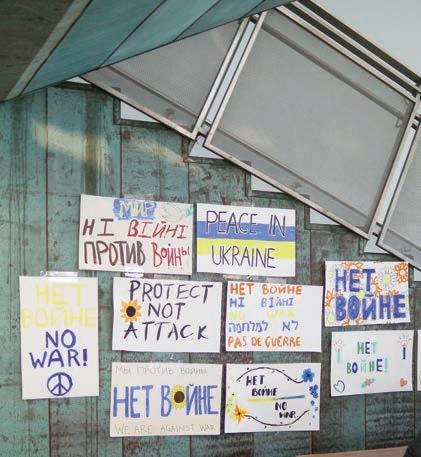
Russian troops have neared Kyiv and attacked many important sites in the city. On March 1, Russia struck Kyiv's main television tower and Babi Yar, the city’s Holocaust memorial, according to The Times of Israel. Ukranian President Volodymyr Zelensky is a descendent of Holocaust survivors. After the bombing, he tweeted, “To the world: what is the point of saying ‘never again’ for 80 years, if the world stays silent when a bomb drops on the same site of Babyn Yar? At least 5 killed. History repeating.”
Kharkiv, Ukraine’s second largest city, has experienced the most “intensive bombardment,” and the
The Disney Movie Encanto manifests familial love and how it exists in many forms amongst the Madrigals.
By MINA ROWLANDcity center “has been turned into a bombed-out wasteland of ruined buildings and debris,” reports Reuters. Reuters continued to explain that the city of Mariupol, in the south, has also experienced intense shelling. On March 3, CNN reported that Russian forces seized control of the city Kherson and surrounded Mariupol.
While Kyiv and Kharkiv are being heavily attacked, Ukrainian forces still hold these locations, said AP. In addition to attacking these major cities, Russia has been attacking residential neighborhoods since the first day of the conflict.
The human costs of the conflict have been severe. AP wrote that “bombings have damanged pipes, electricy lines, and basic services in Ukraine and hundreds of thousands of Ukranian families are without drinking water.” With continuous
Board urges to uplift Black and POC work at Univ. By THE EDITORIAL
BOARDThe Student Union Senate voted to approve the Union’s budget for the 2023 fiscal year at its March 6 meeting, and also voted on chartering three new clubs. The Union’s head treasurers Amanda Shneider ’22 and Josh Hopen ’23 presented the details of the budget at the previous week’s meeting.
The Fireside Theater Company returned to the Senate after gaining status as a recognized club last semester, this time requesting to become a chartered club. They discussed the structure of their
club, the play they put on last year, and explained how they plan to connect students with interest in theater-related careers to various professionals in the field.
“Anything that supports theater, music, or visual arts –– I’m all for it,” said Sen. Peyton Gillespie ’25. Coles had doubts surrounding some aspects of the club.
“Supporting the arts is great, but we’ve already got a bunch of arts clubs on campus,” Coles said. “I think [The Fireside Theater Company] can put on more than two events a year.”
Sen. Nicholas Kanan ’23, who is a member of the FTC, said that the organization
serves as a unique and useful resource for theater students.
“The more professionals we work with, the larger our network will grow,” Kanan said.
“I think it’s a no-brainer.”
The Senate chartered the theater company with three abstentions and only Coles voting in opposition.
Director of Health and Safety Skye Liu ’23 presented her new club, Mood Psychology, to the Senate and asked that they charter it. The club, she said, is intended to give Chinese international students a place to find mental health services that are better than what they can get at the Brandeis Counseling Center.
“Whenever [international
Union discusses FY 2023 budget proposal at Feb. 27 meetingfor. “[We want] increased accountability so that allocations do not seem arbitrary,” Hopen said.

The Senate will vote on the proposal next week.
students] go to the BCC, I feel that they think that all of our problems are kind of the same,” Liu said. She said that the Mandarin-speaking counselor at the BCC tends to assume that homesickness and academic stress are the primary issues that international students face.
According to Liu, Mood Psychology is a registered NGO with chapters across the United States and Canada, which provides mental health services to Chinese students. However, Liu also said that the club would be open to all students, and that she would work on translating all materials relevant to the club into English.
POLICE LOG
The Senate chartered Mood Psychology by acclamation.
Jason Dayan ’23 requested that the Senate charter the Brandeis Haircutting Club, which he said would “teach the art of cutting hair” at its weekly meetings.
After the presentation, Senators agreed that the club was not at a stage where they would be willing to charter it.
“Preparation is key, if a club isn’t prepared for something like this, they’re not going to do anything,” Vice President Courtney Thrun ’22 said. “I would love to see them back again once they’ve figured out their club a bit more.”
However, Coles suggested that the Senate vote on the
club immediately, which he admitted would almost eliminate the club’s chances of ever being chartered.
“I don’t think that this needs to become a club,” Coles said. “We’re not voting on how much to give them, just if they deserve funding in the first place, and I don’t think they deserve funding in the first place.”
However, the Senate decided to give Dayan more time to prepare and demonstrate interest in the club, and will vote on it on a future date.
“I can’t believe we spent so much time on the Brandeis Barber Club [sic],” Coles said.
treated by BEMCo staff and refused further care.
Nai Qashou ’22 and Abdukadir Ibrahim ’22 of the Network of Arab Students came to update the Senate on the club’s activities so far this semester and to request that the Senate charter the organization.
Qashou said that the club creates a community that discusses Arab history, culture, and identity.
She also said that the NAS had become an Intercultural Center club, a subcategory of student organizations which are generally related to specific cultures, and are based in the ICC in East Quad.
The Senate chartered the club by acclamation.
The Brandeis Haircutting club was supposed to present at the meeting, but no representatives attended. Thrun rescheduled the club to present next week.
— Max Feigelson
Mar. 1—There was a medical emergency in the Goldfarb Library. The party was treated by BEMCo staff and refused further care.
Mar. 2—There was a medical emergency in Rosenthal Quad. The party was
Mar. 3—There was a medical emergency in East Quad. The party was treated by BEMCo staff and transported to a local hospital via ambulance.
Mar. 3—There was a medical emergency in the science complex. The party was treated by BEMCo staff and refused further care.
Mar. 3—There was a medical emergency in the Usdan Student Center. The party was treated by BEMCo staff and refused further care.
Mar. 5—There was a
medical emergency at the Stoneman Infirmary and Public Safety Building. The party was treated by BEMCo staff and refused further care.
Mar. 5—There was a medical emergency in the Village. The party was treated by BEMCo staff and refused further care.
Mar. 6—There was a medical emergency in Massell Quad. The party was treated by BEMCo staff and transported to a local hospital via ambulance.
— Compiled by Noah Zeitlin
Graphic by NOAH ZEITLIN/the Justice Follow
The Justice is the independent student newspaper of Brandeis University. The Justice is published every Tuesday of the academic year with the exception of examination and vacation periods.
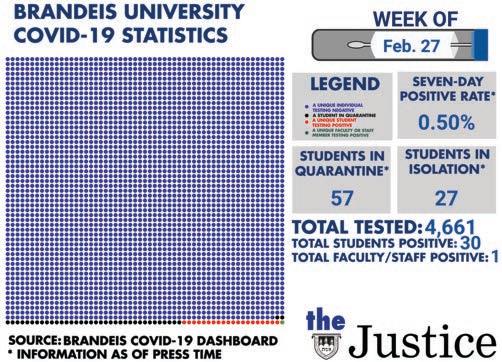
The Justice Brandeis University Mailstop 214 P.O. Box 549110 Waltham, MA 02454-9110 Phone: (781) 736-3750
editor@thejustice.org news@thejustice.org forum@thejustice.org features@thejustice.org sports@thejustice.org arts@thejustice.org ads@thejustice.org photos@thejustice.org managing@thejustice.org copy@thejustice.org layout@thejustice.org 2 TUESDAY, MARCH 8, 2022 ● NEWS ● THE JUSTICE
! @theJusticeNewspaper Image Courtesy of CREATIVE COMMONS Do you have a nose for news? Contact Hannah Taylor and Jacklyn Goloborodsky at news@thejustice.org Want the scoop?
Image Courtesy of CREATIVE COMMONS
Managing Editor
■ The History department organized a panel discussing the Russia-Ukraine war on Thursday, a week after the war began.
By ELLA RUSSELL JUSTICE STAFF WRITERFive speakers, Professor Steven Wilson (POL), Paul Jankowski (HIST), Renanah Joyce (POL), Kerry Chase (POL), and Chandler Rosenberger (IGS) offered their historical, political and sociological insights into the conflict.
Wilson noted that “the ship has definitely sailed at this point” regarding Russia’s democratic status because it is clear that “Putin is running the show.” As an aging dictator, his invasion of Ukraine is consistent with a desire to leave a legacy, he said. According to Wilson, analysts of Putin’s military buildup on the Ukraine border were expecting military posturing — nothing like full-scale war. However, Wilson said that based on Putin’s past speeches and actions, he has shown a belief that the fall of the Soviet Union was a terrible thing, less because of the fall of communism than because of the geopolitical ramifications of the country’s 15 republics breaking up. He explained that this nostalgia for the Soviet Union, along with Russian myths of Kyiv being the founding city of Russia, were among Putin’s rationales for refusing to recognize Ukraine as a sovereign country and considering the Ukraine invasion as a domestic affair.
Considering the dictatorial politics of Russia, Wilson spoke on the possibility of resolving the invasion by overthrowing Putin. He cautioned on hopes he has seen on social media of such an outcome, arguing that even if Putin were deposed, the state of Russian politics made it likely that one dictator would merely be replaced with another. Wilson discussed the potential groups with the power to overthrow Putin. He said that since rising to power in the 2000 election, Putin has kept prominent Russian oil oligarchs out of politics in exchange for political stability. The invasion and accompanying sanctions have shown that Putin is not holding his bargain, but these oligarchs are still far from the reins of power. A military coup is similarly unlikely, Wilson said, due to a long history of committed subservience shutting down coups throughout the 20th century. He explained that those in power in the military were the most adept at court politics and had little incentive to change the system. “Ironically, the security services are where [Putin has] the least support,”
considering Putin’s past as a KGB agent, Wilson said. He noted that despite Western perceptions of Putin as a “4D chess master,” Putin was seen as a mediocre failure in the KGB, getting into politics to get out of a dead end post.
Jankowski spoke on the numerous historical comparisons that could be drawn from Adolf Hitler’s invasion of Europe in the 1940s. Just as Putin has claimed that the majority ethnic Russian population in Eastern Ukraine is being mistreated, Hitler’s annexation of the Sudetenland was justified by arguments that the majority of the region’s population was ethnically German, Jankowski explained. In the case of Hitler, Jankowski said the rest of Europe accepted his justifications for annexing the Sudetenland in the hopes of avoiding further aggression. Similarly, Putin’s annexation of Ukraine’s Crimean peninsula in 2014 was met only with mild condemnation by the West.
Jankowski spoke on the use of sanctions against Russia. He warned that “sanctions that don’t work are worse than no sanctions at all” because they run the risk of forming a “community of the damned.” He said that the League of Nations attempted to impose sanctions on Japan and Italy after their acts of aggression in Ethiopia and China respectively, but with numerous countries not following through, the sanctions only drove the two nations away from the League of Nations and towards an alliance with Germany.
Joyce discussed the possible security responses of the North Atlantic Treaty Organization and other foreign powers to the war. “NATO was founded as a bulwark against Soviet aggression,” she said. However, she explained that while NATO is obligated to defend member countries, it is difficult to determine their response to a country like Ukraine. The country is not a member of NATO, but it is close partners with the organization and it has sought NATO membership over recent years. She argued that on one hand, Russia’s invasion represented a dangerous attack on the norms against international conquest. On the other hand, efforts like the U.S. led military coalition to counter Iraq’s invasion of Kuwait were “not going to work in the Ukraine” because of the serious risks coming from a war with Russia. Joyce cited the recent news that Putin had put Russia’s nuclear forces on alert. She explained that this fear of escalation was holding countries back from helping Ukraine establish a no-fly zone because of the implications of foreign pilots shooting Russian planes down.
Instead, Joyce said that European countries have sent aid to Ukraine in the form of weapons and humanitarian supplies. Even Sweden and
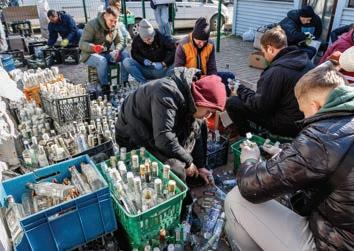
Switzerland, known for their neutrality, are sending weapons. NATO also gets credit for Ukraine’s success in holding back the Russian army due to past years of investment into training, Joyce explained. She said that Ukraine’s military was known as the “paper army” because they were seen to be better at paperwork than fighting. The other major action, she noted, has been sanctions in the hopes of causing a sufficiently harsh burden on Russia to compel Putin to stop fighting.
Joyce emphasized the necessity for off ramps for Russia in ending the war, asking “How can Russia reverse course and still save face?” After all, she noted that the West could make the war painful through economic sanctions, but Russia still had an overwhelming advantage over Ukraine in terms of material power. She asked what acceptable compromise there was for Russia and Putin, seeing as he is likely to have most of his ambitions stymied. NATO is more prominent than ever with the shift of Germany against Russia. She said that if Russia were to stop the war, the West would need to consider which sanctions to lift. For this consideration, they would need to consider whether their ultimate goal was a weakened, punished Russia or a Russia that is reintegrated with the rest of the world.
Chase talked about the role of the UN in addressing the conflict. He agreed with Joyce that the most obvious way to stop Russia — military force — was an unacceptable and dangerous choice. Instead, he promoted the current following of “Plan B … making the war as painful for Russia as possible,” arguing that the UN had an important role to play in the conflict. He said that the UN is a “really easy target for overinflated expectations,” and that it is important to “recognize that the UN cannot, through naming and shaming, change the actions of a leader with no shame.” He addressed concerns on social media that Russia is presiding over the Security Council and was given the power to veto the Security Council’s resolution condemning the war. Russia’s veto, in fact, does not really matter, Chase argued, because the Security Council has no power to physically stop the invasion. The resolution was instead an effective means at rhetorical condemnation, he said, because in vetoing the resolution, Russia took its place among the world’s “pariah states,” representing the “lone hand of the aggressor nation.” He argued that the UN’s “currency” is international legitimacy. The countries that voted to condemn Russia are now on record as doing so, and so they are given pressure to follow through, Chase said. He speculated that the list of abstaining countries is where
Putin will look for aid, so it is important to target the abstaining nations in advance to dissuade them from helping him.
Rosenberger discussed the sociological elements of the war, namely the question of “who is fighting for what” and whose vision of Ukraine would prevail. He argued that Putin’s basis for invasion was “based on a mistake.” In looking through Putin’s speeches, Rosenberger saw Putin revealing the extent of his ambitions in Ukraine and beyond. With Ukraine in particular, Rosenberger said that Putin’s justification for invasion was in righting historical wrongs. He said that Putin’s speeches cite the mythical description of Kyiv as the “mother of all Russia,” along with ethnic and language similarities, in order to claim that Russia was destined to be bound with Ukraine but was always being broken up by a series of eternal enemies.
Rosenberger argued that the mistake of this theory is that it ascribes certain characteristics to make a person part of a nation regardless of their own choices. Despite Putin’s theories, there are 44 million people who think of themselves as Ukrainian and reject Putin’s mystical vision.
In 1991, 92% of Ukraine approved their independence, and while ideas of Ukraine’s character have ebbed and flowed, there has never been a serious threat to sovereignty, Rosenberger said. He argued that in many ways, Ukraine is defining itself as the opposite of Putin’s Russia.
Regarding the potential escalation to a wider conflict, Joyce remarked that it is impossible to say anything for sure as there is “simultaneously an overload of information and a deficit of information.” There is a flood of videos and posts on social media about the war, but there is very little verification, as most social media posters have strong motives for shaping the information to suit their agendas. The lack of accurate data and misunderstandings of the relative power of countries are important factors behind conflict escalation, Joyce said. She noted that on the part of the EU and the U.S., they are carefully calibrating their responses to avoid crossing Putin’s red lines. One potential red line is the vigorous resupplying of Ukraine through Poland, a NATO country.
Putin targeting the supply chain to Poland would be a dangerous escalation of the conflict, she said. Similarly, she explained that Ukraine would benefit from a better air force, but they are limited by a lack of training on certain high tech aircraft, making the introduction of foreign pilots a tempting but dangerous prospect.
A Russian audience member commented on the common question about protest in Russia, noting that at that time, there had been 7,000 ar-
rests under the threat of 15 year sentences. She also asked about Putin’s justification of neo-Nazism. Rosenberger speculated that this argument is about bringing Russia together against a historic enemy. However, he noted that this justification was ironic in that Putin himself has been public about reading neo-Nazi authors. Rosenberger reiterated the likelihood that Putin has entered an “extreme ideological space.”
From the audience, Prof. Irina Dubinina (RUS) noted that “Putin extracts a small piece of the truth and creates a different reality.” She explained that there is a presence of neo-Nazi groups in Ukraine, along with ethnic and cultural differences between regions in Ukraine, with East Ukraine being the most ethnically Russian. She also argued that Putin’s arguments about NATO expansion could be justified by the 1994 Budapest Memorandum creating security relationships between NATO and Eastern Europe.
Rosenberger responded that although there is a neo-Nazi presence in Ukraine, they are not the aggressors in this situation. He said that with all the justifications and disinformation floating around, it is important to remember that children are dying in Kharkiv for geopolitical ambitions.
Regarding NATO, Chase agreed the relations of the organization with Eastern Europe have been controversial. Nevertheless, he argued that the counterfacts, with U.S. and NATO shunning Ukraine and other Eastern European countries, carried its own risks. For example, he explained that NATO had held back from establishing greater relations with Ukraine because of fears of provoking Russia, resulting in Ukraine having less military power in the face of this invasion. He also noted that the participation of Eastern Europe in NATO raises the question of why Russia has never been considered as a potential NATO member. This oversight has been argued to have a basis in centuries old Orientalism, Chase said. Regarding the threat of nuclear war, Joyce referenced the stabilityinstability paradox theory, where nuclear powers do not fight each other directly because of mutually assured destruction. Instead, they fight each other through third states, as is the case with Ukraine.
However, she said that if the situation worsens enough in Ukraine for Russia, such as the war lasting long enough for sanctions to dry up essential military stockpiles, then it is conceivable that Putin would decide to attack Ukraine with tactical nuclear weapons to achieve victory. She argued that this was likely a long term possibility, becoming an issue if the war continues for “months, at minimum.”
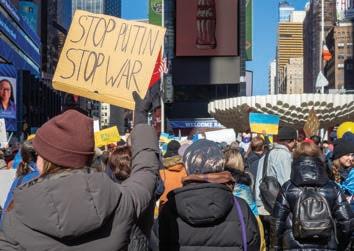
Russia launched a military attack on neighboring country Ukraine on Feb. 24. While unprovoked by Ukraine, the tension on the Russian side has been building up over a long period of time, as Vladimir Putin, the president of Russia, has continuously denied the existence of Ukraine’s sovereignty as a state.
At a virtual event open to the public on March 2, sponsored by Emory University and Georgia Tech, Yale professor Timothy Snyder discussed how this crisis began. Snyder is an expert in Russian and Ukrainian studies, as well as the Richard C. Levin Professor of History at Yale University and a permanent fellow at the Institute for Human Sciences in Vienna.
Snyder began his presentation by outlining the reasons for Russian aggression against Ukraine. “If we look at the war planning, and if we look at the rhetoric among Russian nationalists, and if we look at the press documentation … we see very clearly that the idea, the purpose, of the invasion was to reach Kiev, destroy the Ukrainian government, capture and presumably kill its head, its president, Volodymyr Zelensky,” Snyder said. “From there, the Ukrainian elite could be destroyed and the remaining inchoate, undefined masses on the territory of Ukraine would naturally drift towards Russia and become part of a larger union.”
Putin’s goal to destroy the nation of Ukraine is genocidal in nature, Snyder said. He explained that, ac-
cording to the Genocide Convention, “targeting the elite of a nation for destruction in the anticipation that that nation will then no longer exist is a genocidal purpose.” Although Putin claims to be fighting genocide through this war, he is actually starting one himself. Snyder compared Putin’s claims to those of Hitler in World War II –– Hitler justified the war by claiming that Germans were being oppressed across the country’s borders in Czechoslovakia and Poland, and Germany therefore needed to invade and destroy those states to protect the German nationality. This rhetoric is “exactly the same kind of atrocity talk that Mr. Putin is using today,” Snyder said.
Putin is justifying his actions by claiming to protect the Russian nationality, as there are Russians living across the border in Ukraine, but he is destroying the sovereign nation of Ukraine and its people, Snyder explained. He emphasized that this war is a fascist action on the part of Russia, and that Putin is using “atrocity talk” as a cover for white nationalism and violence.
“Perhaps the worst thing about the atrocity talk is that it serves to trivialize some of the concepts that we have from the Second World War, which allow us to define the world that we live in morally and aspirationally,” Snyder said. “If you speak about ‘denazification’ and have in mind the murder of a duly-elected Jewish president, if you speak about genocide and have in mind the genocide that you were about to commit, what you’re doing is turning these words around, you’re making a mess of them, you’re making them very difficult for other people to use. So the attack on Ukraine is bad enough, of course, but the language that is being used to justify it is a second kind of offense and an important one.”
Snyder also discussed how Putin’s language surrounding Russia’s military attack blurs the distinc-
tion between history, memory, and myth. History, as Snyder defined it, is explored with “uncertainty.” He explained that the past has to be organized and evaluated in different ways through a mindful approach. Memory, on the other hand, “means an organization of the past in such a way that only one set of events could have happened,” he said. “If we are comforted that we were always on the right side, if we are confident that we in the past were always innocent, then the tangible political effect of that is that we then believe that whatever we do now must be right.”
In Russia’s case, the country has memory laws in place to ensure that the past is “remembered” in specific ways that seek to shroud a dark past.
One such memory law was renewed just prior to the invasion of Ukraine. This law, Snyder said, punishes Russian citizens who speak about Putin and Hitler’s alliance in World War II, during which the Soviet Union invaded and annexed half of Poland and the three Baltic states ––Estonia, Latvia, and Lithuania. The strengthening of this memory law highlights key concepts of Putin’s rhetoric and actions against Ukraine.
Snyder explained that Russia is behaving in a similar fashion compared to the Soviet Union in 1939, which denied Poland’s sovereignty and characterized the invasion as a “rescue operation,” rather than a war –– just as Russia is doing to Ukraine now. “The myths cleanse everything, they purify everything. They make history, they make the past seem like just one cycle,” he added.
Moreover, Snyder said, Putin essentially claims that it is “God’s will that Ukraine and Russia be one country,” referencing the beginning of the nation during times of early Eastern Christianity, and writing this version of history into Russia’s memory. This blending of history
with memory and myth is what creates a simplified historical cycle and a dangerous precedent for the future, leaving out the complexities and the human agency involved in the nation’s past.
“In that story, there’s no room for anyone to disagree with the dictator,” Snyder said. “The dictator has literally become the arbiter of history. The dictator is literally writing what happened in the past, and therefore what is permitted in the future.”
In addition to being genocidal, the war in Ukraine is imperialistic. Putin does not want the state and people of Ukraine to have the right to selfdetermination, Snyder said. This is also the reason why Putin does not want Ukraine to be permitted to join the European Union, he added. That being said, there is no deep-seated conflict between Ukraine and Russia that provoked the war, but rather a one-sided tension amongst extreme Russian nationalists –– specifically, Russian nationalist leaders –– since much of the country was left surprised and unprepared when the violent attacks on Ukraine began, Snyder explained further.
He added that Russian nationalism and imperialism were also the reasons behind the initial Russian invasion of Ukraine in 2014, during which Russia annexed Crimea.
Furthermore, Snyder explained that there has been a rise in postmodern inequality due to capitalism following the end of the Cold War in 1989. While this inequality can be seen across the globe, “it doesn’t seem to have been sharper anywhere in the world than in the Russian Federation, where just a very small number of people seem to control the majority of the wealth and where the president of the country is at the head of the dominant oligarchical plan,” Snyder said.
In Russia, he explained, postmodern inequality has reached such an

extreme level that the country has become disconnected from the rest of the world both in terms of communication and understanding of how the world works –– with increased inequality comes decreased social mobility.
Due to this phenomenon, Putin does not have the desire nor the ability to operate through domestic policy. Instead, he operates through foreign policy, specifically, foreign policy that benefits Russian elites such as himself instead of the country as a whole. These factors lead to issues like Putin’s tyranny and his radical decision to attack Ukraine, Snyder explained.
As opposed to a deeply rooted conflict between the two countries, Putin’s Russian nationalism, imperialism, and inequality-caused disconnect from the world have led to Russia’s war against Ukraine. Snyder also added that in addition to the war being fought across Ukraine, the war is also being fought across the international economy and “across the dimension of factuality.”
Continuing to emphasize Russia’s censorship and misleading rewriting of history, Snyder said that censoring alternatives to Putin’s language and conceptualization of the past and future means censoring the facts. “It also means pushing away the principle of noncontradiction,” he said.
“We’re not just dealing with a tension, we’re dealing with an attempt to disable us intellectually,” Snyder continued. “When Mr. Putin says that the invasion has to take place in order to denounce a country, and that country is ruled by a democratically elected Jewish president, that’s not just a tension, a misunderstanding of a problem … it’s an attempt to disable our ability to reason from point A to point B. There’s an attempt to create a vacuum which sucks in all the facts. There’s an attempt to create a kind of emptiness in which this kind of tyranny can continue.”
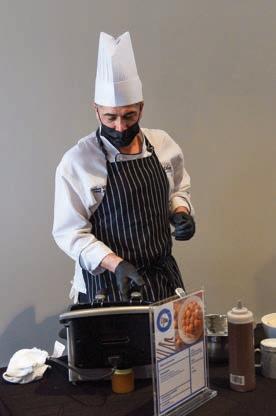
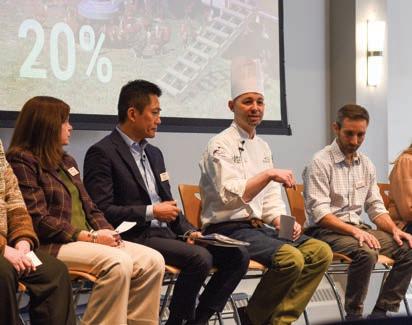
■ Students had the opportunity to give input for a new dining vendor to start in the upcoming academic year.
By LEAH BREAKSTONE JUSTICE EDITORIAL ASSISTANTBrandeis undergraduate students pay, on average, $7,070 on meal plans per year, according to the Office of Student Financial Services. Since 2013, students have paid this price for Sodexo as stated by the Food Service Director website. Sodexo’s contract was meant to end in 2020; however, due to the pandemic, they received a two year extension, which is set to end in June 2022, the Office of the Executive Vice President, Finance, and Administration said.
Earlier in the academic year, the University issued a Request for Proposals to multiple vendors, according to the Office of the Executive Vice President, Finance, and Administration. These vendors include AVI, Bon Appetit, Harvest Table, Nexdine, and Sodexo. Between Monday, Feb. 28 and Wednesday, March 2, these bidders presented their proposed plans. They also took questions from people in the audience, as well as those watching online.
The vendors who presented were chosen by “the Dining RFP Steering Committee, a group of faculty, students, and staff tasked with selecting the food service operator whose contract will begin in July 2022,” Lois Stanley, Vice President for Campus Operations and the chair of the committee, wrote in a March 5 email to the Justice. Stanley continued that “we worked with the consultant Innovative Hospitality Solutions to identify potential operators. The committee screened about ten of those firms in the fall and selected five to be invited to participate in the RFP process.” Addi -
spite the enormous efforts of our faculty and academic support staff to help students, being in isolation or quarantine and having to make arrangements for tests to be conducted remotely or to join important classes asynchronously will make things more difficult.”
tionally, there were two students on the steering committee, Stanley wrote. Student involvement was a dominant theme of this decision making process: “The consultants met with student groups in the fall. Students attended the community presentations this past week [and] [w]e received close to 300 comments through the feedback portal, mostly from students,” Stanley wrote.
Students had the opportunity to voice their opinions and concerns at the presentations or via a feedback form. Some concerns included topics of sustainability, inclusivity and accessibility for those who keep kosher or have other dietary restrictions, and keeping the current Brandeis dining workers union contract.
Brandeis Sustainability Ambassadors advertised the presentations to the community, attended the presentations to learn about their sustainability goals and practices, and voiced questions about these goals and practices, according to BSA Forrest Shimazu ’23 in a March 5 email to the Justice. Specifically, “the practices we looked for in the vendors included their management of food waste, how much of their food is locally and sustainably sourced, the agricultural practices they use, and how much meat they serve,” Shimazu wrote. “We also look for how they continue to plan on improving these practices in the future.” Shimazu was personally interested in the amount of meat each vendor serves, and if they had plans to reduce this amount. In the end, only one company met the sustainability expectations of BSA in putting sustainability as the top priority and “that was Harvest Table,” Shimazu wrote. “They source 65% of their food locally, which exceeded our current goals and [was] far greater than the other vendors.”
According to an attendee, Eitan Marks ’24, “people were concerned a lot about kosher food and a lot
about making sure that the dining workers who currently work at Brandeis don’t lose their jobs,” he wrote in a March 4 email to the Justice. “Those were really the two main points for me.” Marks has previously been involved in advocating for better kosher food on campus and has had conversations with director of University Services, Jeffrey Hershberger, as well as Sodexo manager Mike Reilly among other Sodexo staff members, he explained.
Marks is concerned with “making sure that kosher food and dining is not an afterthought, rather it is a core essential part of the vendor’s plan for what they want to do.” Additionally, when listening to the presentations, Marks was thinking about the dining workers; “A lot of these workers have worked at Brandeis for 20, 30, 40 years,” he said. Marks continued that “I want to make sure that we’re picking a company that is committed to keeping them on, and if not hiring them with their current wages, even better wages.”
Like Shimazu, Marks’ top dining vendor choice was Harvest Table. Marks expressed excitement over their locally sourced food, specifically relating to sourcing kosher food. Furthermore, Marks explained that the locally sourced food would also be beneficial in avoiding issues with the national supply chain. “My biggest takeaway was that I just loved Harvest Table,” he wrote. “They have a great business model and really great people.” The proposed management team, whom he spoke with, “seem to be very open to talking and working with students and clearly have a passion for what they do,” Marks added. A vendor will be offered a bid by the end of March with the new contract beginning this July, according to the Office of the Executive Vice President, Finance, and Administration.
Seventy-six students and 15 faculty and staff members tested positive for COVID-19 in the weeks leading up to and throughout the February break. Dozens of students were placed in quarantine and isolation, but cases dwindled towards the end of break.
Morgen Bergman, associate provost for academic and strategic initiatives, told the Justice in a Feb. 28 interview that one main source of the outbreak was an offcampus party. Most of the positive cases came from individuals who attended this event and their close contacts who tested positive subsequent to being identified and placed into quarantine. Bergman acknowledged that the outbreak was significant, with many people testing positive, but also highlighted that the spread was contained, thanks to rigorous contact tracing and frequent testing.
Positive cases decreased to smaller numbers towards the end of break, with 12 new positive cases the week of Feb. 20. Cases have increased this week, though the University expected an increase in cases during the return to school following all the travel that occurred in the February break.
Bergman stressed that each individual needs to take responsibility for their health and continue to make good choices, especially as midterms are approaching. “De-
96.7% of the Brandeis student body, as well as 95.6% of the faculty and staff, are fully vaccinated, according to Brandeis’ COVID-19 Dashboard. Bergman pointed out that through this latest surge, there have not been any severe cases of COVID-19 among students. The majority of positive students have experienced mild symptoms for a few days at most, she said.
Bergman shared that the staff who support the COVID-19 testing and tracing program at Brandeis care deeply about the wellbeing of the students and work to support them through their isolation or quarantine period. She stated that staff and faculty from across the University work tirelessly to ensure that the needs of these students – academic, emotional, and physical – are supported. The staff always appreciates respectful communication about ways that improvements can be made or bringing to light problems that need to be addressed, she said.
With the mask mandates being lifted around the country, state, and in Waltham, Bergman ended the interview full of cautious hope. “Right now, it’s an exciting time, but also a time to remain cautious and follow the data. We know how COVID spreads; we know how to prevent it. It’s important that each individual in our community takes responsibility to exercise common sense in keeping themselves and their friends healthy.”
■ Many students tested positive or were quarantined, but the outbreak seems to have been contained.

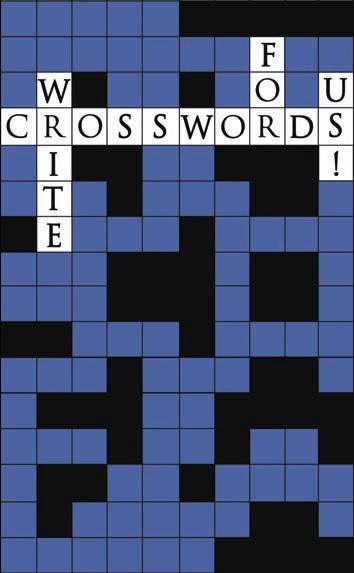
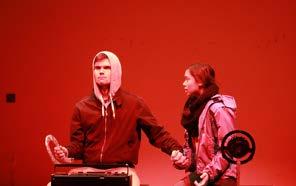
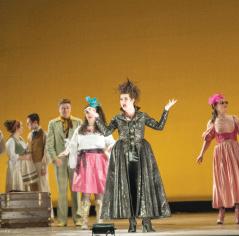
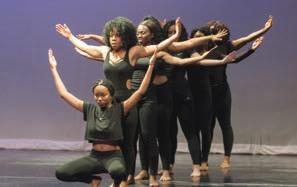
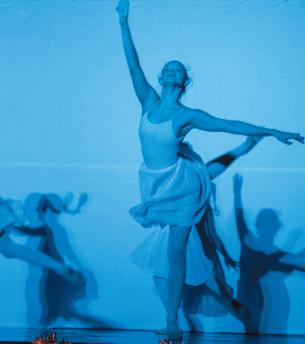
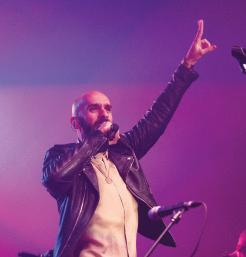
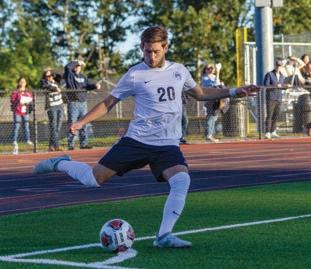
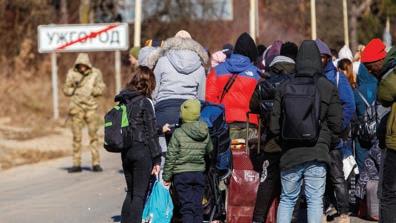
CONTINUED FROM 1
bombings in Kyiv, many Ukranians are taking shelter in Kyiv’s subway stations. Subway stations are also being used as bomb shelters to treat sick children, pregnant women, and newborn children. In Mariupol, Russian troops have blocked the supply of electricity, water, heat, and food as well as destroyed railways, bridges, and trains, reports CNN. Ukranians are attempting to leave major cities and the country. On March 3, the UN Refugee Agency reported that over 1 million people fled to neighboring countries, and this number is predicted to reach 4 million in the following weeks. Ukrainian refugees are going to Poland, Hungary, Romania, Moldova, and Germany, reported AP.
Although the Ukrainian military is substantially smaller than Russia’s, reports the Guardian, Ukrainian nationalism has led them to see significant success against the far larger invasion force. In a lecture on March 1, Prof. Chandler Rosenberger (IGS) highlighted the fierce nationalism of Ukranians and their willingness to take extraordinary risks to protect their country — a factor that Putin didn’t necessarily consider when attacking. Across the country, civilians are volunteering their services to join the military resistance against Russian troops, and Ukranians across Europe are returning to their home country to join the fight, reported the Wall Street Journal. Ukrainian nationalism is not only being seen in the typical military front, but across the country, citizens are training to fight with molotov cocktails according to Reuters.
Many are now calling Ukrainian president Volodymyr Zelensky a “convincing war leader,” says BBC. BBC explained that he has been a source of motivation and leadership for his people; he has “rallied the nation with his addresses and video selfies and given voice to Ukrainian anger and defiance of Russian aggression.”
The CFR article explained that the conflict initially began in 2014 when Russian troops took control of the Crimean peninsula in the south of Ukraine. Since then, there have been “regular shelling and skirmishes occurring along the front line that separates Russian- and Ukrainian - controlled border regions in the east,” in the Donetsk and Luhansk oblasts. These smaller, less severe, military operations escalated in Dec. 2021 when Russian President Vladimir Putin deployed tens of thousands of Russian troops to the Ukrainian border, as reported in a U.S. News & World Report article. In addition to the deployment of troops, Russia demanded NATO’s pull back of troops and weapons from Ukraine and a legallybinding assurance that Ukraine does not join the alliance, said a Reuters article. In a March 2 interview with
Prof. Sabine von Mering (ENVS), she said that everyone in the West underestimated how much the Russian government feels threatened by NATO enlargement in the East.
In a March 2 interview with Prof.
Steven Wilson (POL), the Justice asked Wilson if there are actions that the U.S. and NATO countries could have taken in the last decade to prevent the current situation. He explained that Putin has been vocal about rebuilding Russian power and “very few of us saw this mass war as being what he would do,” Wilson said. Wilson explained that he doesn't believe there were many concrete actions that could have been taken because if Ukraine had been let into the EU and NATO, it simply would have forced a military confrontation between the powers.
These military actions and security demands at the end of 2021 escalated to Russia recognizing the Ukrainian regions of Donetsk and Luhansk as independent on Feb. 21, when Putin declared that Russia would protect its citizens in the two regions. Simultaneously, Russian troops moved onto the borders of Ukraine –– to the Belarussian border in the north, Crimea in the south, and Donetsk and Luhansk in the east. CFR explained that Russia’s intention to invade Ukraine was clear from Russia’s “growing military presence at the Russia-Ukraine border.” This recognition of independence of Donetsk and Luhansk was used as the pretext for the full scale invasion of Ukraine on Feb. 24, explained U.S. News & World Report.
Putin has “grievances with how the Soviet Union broke up,” Prof. Rosenberger said. Students had the opportunity to give input in the selection process for a new dining vendor to start in the upcoming academic year.
. Putin’s speech on Feb. 21 showed that “he is angry about the existence of Ukraine as a sovereign country… He is not interested in taking a little piece of eastern Ukraine — he wants to abolish the idea of Ukraine. He thinks Ukraine is entirely an artificial creation,” Rosenberger explained. In regards to Putin's motivation for the attack, Rosenberger explained that Putin has been extremely isolated during COVID-19, pushing out advisors who disagreed with him and allowing himself to “steep in the ideology of the great Tsarist Russia.”
In his lecture, Rosenberger also discussed how other countries are reacting to the conflict. The UN Security Council, which is meant to protect territorial integrity and national sovereignty as well as defend smaller countries against imperial aggression, has not passed a resolution to support Ukraine. The five permanent members of the Council include Russia and the current president of the UN Security Council, who is Russian, has vetoed proposed resolutions to support Ukraine, explained Rosenberger. This being said, von Mering explained that we are witnessing a strong show of European unity with Ukraine. Putin may have thought
CONTINUED FROM 1
She was also a member of the U.S. State Department’s Historical Advisory Committee.
Her book, “White Rage: The Unspoken Truth of our Racial Divide,” published in 2016, was a New York Times Bestseller as well as the winner of the 2016 National Book Critics Circle Award for Criticism. It was also named a New York Times Notable Book of the Year, a Washington Post Notable Nonfiction Book of the Year, a Boston Globe Best Book of 2016, and a Chicago Review of Books Best Nonfiction Book of 2016. The book was inspired by an op-ed Anderson wrote for The Washington Post in 2014 as a response to media commentators referring to the protests after the shooting of Michael Brown as “Black rage.” In her op-ed,
this would push a wedge through European countries but it has done the opposite, explained von Mering.
One of the most prominent responses from Western countries in support of Europe has been levying severe economic sanctions against Russia.
A White House Briefing Room report from the first day of the conflict stated that “the United States, along with Allies and partners, is imposing severe and immediate economic costs on Russia in response to Putin’s war of choice against Ukraine,” with the goal of isolating Russia from the global financial system. The report detailed that the sanctions have targeted Russia’s largest financial institutions. Wilson explained that the economic sanctions being imposed due to this invasion are completely unprecedented for a country of this size in the world economy and go far beyond any previous conception of sanctions. Western sanctions on Russia include banning certain Russian banks from the Society for Worldwide Interbank Financial Telecommunications — the network that facilitates payments in the global economy — and restricting Russian financial institutions like the Russian Central Bank, explains CNN. CNN reported that the U.S. has imposed sanctions on the state-owned Russian Direct Investment Fund, technology exports, numerous Russian oligarchs and their families, and multiple stateowned financial companies. Some of the largest sanctions from private companies have been Nike and Apple closing their online stores in Russia, MSC and Maersk suspending container shipping to and from Russian, and Boeing and Airbus stopping supply to Russian airlines. Cultural figures and companies are also imposing restrictions. For example, Disney, Warner Bros., and Paramount have paused releases of new films in Russia and many musical artists have canceled their shows and concerts in the country, says CNN.
On the effect of economic sanctions, Wilson explained the goal of Western countries –– a lot of these sanctions are not aimed at Putin directly changing his mind because he is not economically driven, Wilson said. The goal of these sanctions is to target oligarchs and get them into the mindset that because Putin is not on their side financially, in order to maintain their financial status, they must remove Putin and withdraw from Ukraine. Wilson added that economic sanctions like these take a long time to affect those in power; therefore they won’t change Russia’s ability to fight this war in the next few months, but they do hurt the average Russian citizen. Pain on normal Russians can eventually lead to pressure on the government to do something because while Putin is a dictator, there are limits to what he can demand from his people before they begin to revolt, explained Wilson.
The Justice asked Wilson if the Western response of primarily economic sanctions will be enough to
help Ukraine. His response was that Putin's threat of nuclear war is preventing the West from intervening more militarily and this is a difficult position to be in. “Putin has repeatedly said if there is direct Western intervention he will use nuclear weapons,” Wilson said. With the threat of nuclear war on the radar, the West has intervened as much as possible in taking proactive steps without crossing the red line of direct military interventions, which include shipping tank weapons, supplying drones, and active real time intelligence for the Ukrainian military, Wilson explained. Most recently, President Zelensky has asked surrounding countries to announce a “no-fly” zone over Ukraine, reported ABC News.
In addition to intergovernmental aid, individuals all across the world are protesting in support of Ukraine ––“there has never been so much unanimity with regards to Ukraine,” said von Mering. “Ukraine is a democracy. A flawed democracy but still a democracy,” Wilson said, and this creates an almost-unanimous support for Ukranians to be “the makers of their own destiny,” he explained.
Major protests have been seen across the U.S., the U.K., Germany, Italy, France, Australia, Japan, Russia, and more, reported NPR.
At a peace rally that von Mering attended in Berlin, hundreds of thousands of people showed up to protest. “The TV here shows nothing else than the war in Ukraine. The information screens and advertisements in Hamburg’s subway had Ukrainian colors. Yellow and blue colors are ubiquitous everywhere you go,” von Mering explained.
In a March 2 interview with Prof. Irina Dubinina (RUS), she discussed the protests against the war in Russia, which have been largely missed by Western media. There have been anti-war demonstrations in major cities like Moscow and St. Petersburg since the first day of the war, Dubinina said. She emphasized the risk that Russian protesters are putting themselves in by coming out on the streets –– they risk their jobs, wellbeing, health, and freedom with the choice to protest against Putin’s actions.
In Russia, the words “attack,” “invasion,” and “war” are banned in reference to the events in Ukraine; only the phrase “special military operation” is allowed. Dubinina gave an example of the detainment of a girl simply for having a bag with the words “no war” written on it. Using these banned words in reference to Ukraine or coming out to protest against the war has led to detainments, which incur significant fees and potential jail time for Russian individuals and their families, continued Dubinina. The detainments are counted as an administrative offense under the pretense of violating COVID-19 restrictions, but this reasoning has been exposed as untrue due to the lack of enforcement of so called COVID-19 restrictions in pro-Donbas protests
and the highly packed Russian metro. “There is no way to have a free protest in Russia now,” Dubinina said. Male protesters risk physical abuse and female protesters are typically threatened with physical abuse when detained.
Looking towards the future, von Mering believes “we need every effort at the UN level, EU level, even NATO level. They have to be smart and think long term.” Von Mering described our world as a “global family:” our economies, supply chains, and health are linked. Wilson expressed a similar sentiment of a massive unification of all Western countries.
The Justice asked Dubinina how she views the future of Russian contributions to culture, to which she responded that Russian educators will be “knocking on the doors of our German colleagues” for advice on how to separate the government actions from culture and people. She expressed how lucky she feels with the support of her colleagues, friends, and students in understanding that this is a difficult time for Russians as well. There have been incidents of anti-Russianism bordering on Russophobia, which, to Dubinina, is painful and frightening but unfortunately not surprising. As a Russian educator of Russian language, literature, and culture, Dubinina said this time is “incredibly difficult both personally and professionally” for her and all educators of Russian language, literature, and studies.
Dubinina expressed the “emotional pain, almost physical pain to be a Russian at this moment” because of the distress and outrage at the human tragedy that Putin and his government have caused. “I feel extreme anger that they stole my right to be proud of my country,” Dubinina said, adding that Russian protests in support of Ukraine give her a little bit of relief from that very heavy feeling.
When asked about what this war means for the future of Russia, the West, and geopolitical order, Wilson responded that this is “Ukraine’s European moment.” This war is redrawing the lines of post-Cold War definitions of Western Europe, and Ukraine is moving towards the West while Russia’s place in the world is changing very quickly. Wilson explained that there is a potential of Russia fully turning east and a “sad trajectory of [Russia] becoming a Chinese client state in all but name.” In regards to the geopolitical balance of power, Wilson is seeing that European people and leadership no longer trust the U.S. and are taking this into their own hands as a sort of “unified federal state.”
On March 3, Russia and Ukraine met for their second round of peace talks in the Brest region of Belarus, reported ABC News. The article continued, stating that Ukrainian officials say the goal of the peace talks is an “immediate cease-fire,” but this second round of negotiations was unsuccessful. In a CNN interview with President Zelensky, who is staying in
Anderson wrote that that response was "white rage at work. With so much attention on the flames, everyone had ignored the kindling." Her other books include “Eyes Off the Prize: The United Nations and the African-American Struggle for Human Rights, 1944-1955,” “Bourgeois Radicals: The NAACP and the Struggle for Colonial Liberation, 1941-1960,” and “One Person, No Vote: How Voter Suppression is Destroying our Democracy.” “One Person, No Vote” was on the long list for the National Book Award in Non-fiction. Her latest book, “The Second: Race and Guns in a Fatally Unequal America,” published in 2021, was a New York Times Editor’s pick and was named one of the Best Social Science Books of 2021 by Library Journal.
While looking at a map will tell you that the wooded area just beyond the southeast edge of campus is Fox Park, most Brandeis students probably know it as simply the woods by “Grad,” the colloquial name for Charles River Apartment student residences. The woods — a two-minute walk from “Grad” and a
Crumbling bricks and cement. Giant slabs of rock. What looks like the top of an enormous concrete pot. An investigation into the ruins in the forest reveals a historical relic in our own backyard.


 By CAYENN LANDAU JUSTICE CONTRIBUTING WRITER
By CAYENN LANDAU JUSTICE CONTRIBUTING WRITER
While looking at a map will tell you that the wooded area just beyond the southeast edge of campus is Fox Park, most Brandeis students probably know it as simply the woods by “Grad,” the colloquial name for Charles River Apartment student residences. The woods — a two-minute walk from “Grad” and a twenty-minute walk from central campus — contain about a half-mile worth of public trails. With swampy inlets surrounding the forest on one side and campus housing on the other, the forest is mostly contained to a small strip of land that extends out from Mt. Feake cemetery.
The woods are small, but the mysteries within them are anything but. Jake Nissen ’23, a student living in “Grad,” reported hearing a strange sound coming from beyond the treeline while waiting for the BranVan one late January evening. “There was a weird sizzling and a mechanical noise that kept going for like fifteen minutes,” Nissen told the Justice on March 7. “I felt unsettled and confused.”

While what Nissen heard remains to be explained, the mysteries within the woods don’t stop there. Upon entering the woods from the parking lot, a pile of ruins can be found on the right side of the trail. Bricks and cement are half-buried under dirt and leaves in the side of a slight hill, old and weathered. The stone slabs, bench-sized, are worn too, as is the strange circular object nearby. What is it all? And why is it there? After weeks of wondering, I decided it was worth an investigation.
I couldn’t deduce much from the ruins alone, so I started the search for answers at the Brandeis Archives. However, Fox Park is public property and not under Brandeis jurisdiction, so I wasn’t able to find much. No leads were found in the University library either. I tried the Waltham Historical Society next, but they could not be reached for comment.
CAYENN LANDAU/the Justice IN THE WOODS: Pictured are scenes from the wooded area of Fox Park, next to the Charles River Apartment residences. Design: Yuan Jiang/the Justice In 2014, Malaysia Airlines flight 370 dissapeared on its way from Kuala Lumpur to Beijing. The plane was never found, and the search was called off in 2017.It seemed I’d hit a dead end. Fortunately, Dana Hamlin, an archivist at the Waltham Public Library, came to the rescue. “The one named structure on that peninsula that I’ve been able to find on old maps is an ice house,” Hamlin said in a Feb. 16 email correspondence. The ice house, drawn towards the bottom left corner of the map she found, is marked to be in the exact spot where the ruins appear in the woods.

Ice houses were extremely popular prior to the invention of the refrigerator. They were used to keep ice cool year-round or to store perishables. New England, historically, was a hub for ice harvesting, and ice shipment lines ran from around the Boston area to the southern United States until the popularization of the refrigerator in the 1920s.
Hamlin was also able to find a potential visual on the area around
the ice house in Fox Park. “A contact at the Waltham Historical Society found this photo of people harvesting ice on the Charles circa 1890,” Hamlin wrote in an email on Feb. 26. “They think it’s near Fox Park, as there’s a cemetery in the background (most likely Mt. Feake) and the ice house was still in use at that point.”While Hamlin detailed that it wasn’t clear if the marked Fox Park ice house was used by a private residence for personal storage or by a larger company, it’s likely that the ruins behind the Charles River quad are what remains of it: a wintery tombstone for a dead trade.
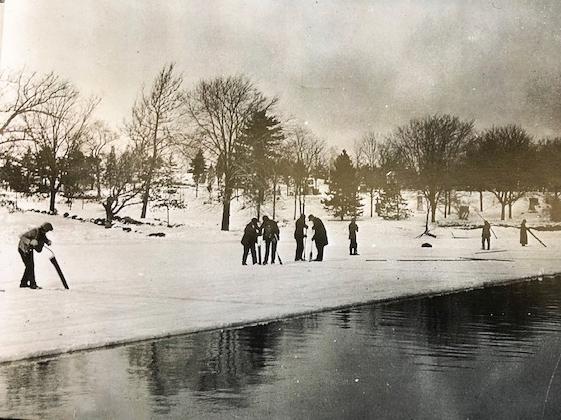
The mystery of the ruins — and its consequent solving — was a wonderful reminder of what might be hiding in plain sight for students. And for Hamlin, puzzles like these are always enjoyable. “I love when I can help solve mysteries,” she wrote.
“It’s the best part of my job.”
 Photo Courtesy of DANA HAMLIN MAP: “Map of the Auburndale Boating Ground or Charles River Between the Dams of Newton Lower Falls and Waltham” by E. G. Chamberlain, 1870 (revised in 1894-1895) shows the location of the ice house that existed in what is now Fox Park.
Photo Courtesy of DANA HAMLIN MAP: “Map of the Auburndale Boating Ground or Charles River Between the Dams of Newton Lower Falls and Waltham” by E. G. Chamberlain, 1870 (revised in 1894-1895) shows the location of the ice house that existed in what is now Fox Park.
I love when I can help solve mysteries. It’s the best part of my job.
DANA HAMLIN
“Jacklyn Golobordsky, Hannah Taylor, News Editors Natalie Khan, Features Editor Sofia Gonzalez Rodriguez, Editor in Chief Cameron Cushing, Managing Editor Gilda Geist, Senior Editor River Hayes, Deputy Editor Leeza Barstein, Jen Crystal, Jane Flautt, Gabriel Frank, Megan Geller, Juliana Giacone, Hannah O’Koon, and Noah Zeitlin, Associate Editors
On Monday, Feb. 28, the Journalism program screened the documentary, “My Name is Pauli Murray,” and hosted a conversation with one of the directors, Betsy West, on March 7. Pauli Murray’s legacy is widely considered to be unknown and unrecognized, despite the long lasting impact they’ve had on the education and judicial system.
Pauli Murray, born in 1910, was a Black, queer, gender nonconforming lawyer, civil rights activist, feminist, poet, and priest. They were the first African American student to receive a doctorate from Yale Law School. Murray refused to sit at the back of the bus 15 years before Rosa Parks captured the nation’s attention and sparked the Montgomery bus boycotts. During the 1950s, Murray published a book, “States’ Laws on Race and Color,” which provided groundbreaking and intensive research about local ordinances that maintained segregation and Jim Crow laws. Thurgood Marshall, the chief counsel of the NAACP, referred to it as the “bible” of the civil rights movement.
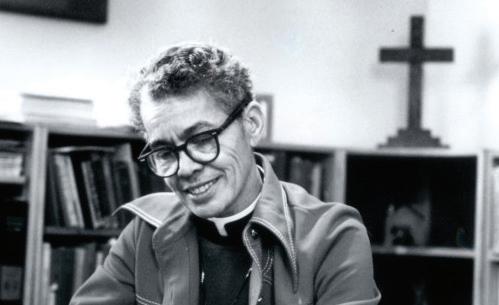
Murray argued that the equal protection clause cited in the 14th Amendment should guarantee not only racial but gender equality. After being appointed by President John F. Kennedy to serve on the Presidential Commission on the Status of Women, they co-founded the National Organization for Women.
The organization utilizes a multi-strategy approach to address its six core issues — reproductive rights and justice, ending violence against women, economic justice, LGBTQ+ rights, racial justice, and constitutional equality for women. Ruth Bader Ginsburg, who was interviewed in the documentary, cited Murray in relation to her Supreme Court opinions and named them as a
co -author of a brief for Reed v. Reed (1971). Murray’s fight for gender and racial justice ultimately secured protections against gender based discrimination for women in the 1970’s and, in a historic Supreme Court ruling in 2020, ensured that LGBTQ+ people could be free from discrimination and harassment in the workplace.
Murray was hired as a Brandeis professor, where they taught from 1968 to 1973. Within two years on campus, they successfully helped transition the American Civilization program into the American Studies program which still exists today. They also created the first legal studies, African American studies, and women’s studies courses at the University. However, despite their groundbreaking research and literature, Murray was initially denied tenure, on the basis that their published writing did not meet the University’s Standard. Thankfully, they appealed and won tenure with support from their mentor Lawrence Fuch.
The board calls on Brandeis to continue facilitating conversations about Black and POC work at the University that often goes unrecognized. Pauli Murray’s crucial contributions, that have secured the protections of many, have almost been erased from our historical narrative.
Many Black and POC faculty at Brandeis are putting forth valuable research which should be uplifted and celebrated before they leave this earth.
—Editor’s note: Justice Editor Jen Crystal ’23 is an Undergraduate Departmental Representative for the Journalism program. Justice Editor Gilda Geist ’22 is an Office Assistant for the Journalism Program. Neither contributed to or edited this piece.
 Lauryn Williams, Forum Editor
Taku Hagiwara, Sports Editor
Megan liao, Acting Arts & Culture Editor
Jack Yuanwei Cheng, Photography Editor
Thea Rose, Acting Photography Editor
Ariella Weiss, Lynn Han, Copy Editors
Samantha Goldman, Online Editor
Lauryn Williams, Forum Editor
Taku Hagiwara, Sports Editor
Megan liao, Acting Arts & Culture Editor
Jack Yuanwei Cheng, Photography Editor
Thea Rose, Acting Photography Editor
Ariella Weiss, Lynn Han, Copy Editors
Samantha Goldman, Online Editor
For the past few years, University Police has received a lot of criticism for their lack of transparency and resolution to their discriminatory practices. This board feels that there hasn’t been sufficient change in improving their procedures, both in efficiency and effectiveness.
University Police officers are known among the student body for their hostile responses to student needs. This has recently been exemplified by negative police interactions recounted by three students sources.

One member of this board was locked out of their dormitory around 2 a.m. Following the lock-out protocols, they called the Department of Community Living, and after their calls went unanswered, they called University Police. The officer picked up in an unenthused manner, ultimately transferring the board member back to DCL knowing that they didn’t pick up the first time. The board member then proceeded to call the University Police several more times, but their calls were ignored. Finally, the officer picked up and said they would contact the Area Coordinator, hanging up before the board member could respond and before giving them information about when the Area Coordinator would arrive. The Area Coordinator came to their aid 30 minutes later.
This board is not only appalled by this behavior coming from the University Police but is also equally concerned by the response had this been an emergency. If someone in a more critical situation or in need of immediate assistance had been ignored like this board member was, there would have been dire consequences, and seeing this response from University Police lessens our trust in their ability to handle crises.
Two board members recount being locked in a hallway of the Shapiro Science Center. Needing ID access to exit either entrance of that hallway and forgetting their ID elsewhere, these board members were stuck there for two hours. They called University Police for assistance. Although the officer attempted to look for them, the police called back shortly afterwards saying they couldn’t find them, leaving the board members to call someone else who knew the area better to get them out. Once again, this board is concerned about the University Police’s inability to properly assist students, which becomes a concern for the student body.
EB ’22, a student who wishes to remain anonymous, recalls an incident involving a man from outside the Brandeis community who made them uncomfortable and knew the location of their dorm. After contacting Public Safety, the responding officer made them feel “very embarrassed and naive for my actions. This victim-blaming behavior did nothing to help my situation,” they told the Justice. This response by the University Police, whose mission is to ensure the safety of all members of the Brandeis community, further highlights inefficiencies and faults in this department.
The board acknowledges that there have been some institutional changes that have directly affected the University Police, and we understand that there is a transitional period in order to properly implement these changes. For example, the primary responsibility in responding to lock-outs has shift -
ed from the University Police to DCL as a step in the Black Action Plan. However, our board members have noticed that this has been met with bitterness from University Police officers.
Aside from the newly implemented lockout procedure, the University’s response to the #StillConcernedStudents movement in 2019 lays out two other concrete ways in which the University is working towards “Public Safety Accountability”: by “[ending] excessive policing of student of color organizations via hiring students for student activities,” and monitoring “social media sites that target members of our community.” This is a great step towards addressing diversity, equity, and inclusion issues, but this board is disappointed in the short list of solutions created specifically for the University Police Department. Especially with their history of racist policing, the other items of the University’s AntiRacism Plan regarding Public Safety do not seem adequate in resolving the problem at hand. For example, “reviewing policies and procedures annually,” or “improving communication,” are both broad and obvious, and even so, these changes do not seem to be occurring. In addition, Brandeis has taken steps to meet only two of the over two dozen demands involving changes to Public Safety listed in the Black Action Plan. Further, Public Safety’s Anti-Racism Plan is difficult to find on the Diversity, Equity & Inclusion website, as it is not obvious to check under the “Executive Vice President for Finance and Administration Office” tab. This is bad enough; however, it’s also discouraging that the Public Safety’s website does not have any acknowledgement of their own Anti-Racism Plan, making it seem more like a University-mandated change rather than their own. This board calls on Public Safety to take the demands laid out in the Black Action Plan seriously in order for all Brandeis students to feel safe on campus.
Chief of Public Safety Matthew Rushton wrote in a March 7 email to the Justice that Public Safety will have a training this month on “Kingian Non-Violence, based on Dr. King’s fundamental philosophy of nonviolence.” Rushton wrote that Prof. Ted Johnson (Heller) would lead the training. Though this board was glad to see this response from Public Safety, there are still many policies and reforms that are unclear. In particular, Rushton’s email included a vague blurb on an upcoming collaboration with Lyft “to support students with an alternative means of transportation that does not involve the use of police officers.” This board is hoping that Public Safety will be able to provide more information on this and other programs moving forward.
This board is also concerned with the pace at which these reforms are happening. “Next year, we will begin a comprehensive strategic planning process that entails community input toward achieving consensus on the role, mission, vision and values for campus safety,” Rushton wrote. This has already been a multi-year process. We believe that the University’s efforts to reform Public Safety and make students feel safer on campus have been insufficient. The pace at which reforms are taking place is not proportional to the urgency of the situation — student safety must be a priority.
Since the 1950s, the Haitian community has been an undeniably strong force in Massachusetts, making it the state with the third highest Haitian immigrant population in America. Throughout the decades they have established churches, non-profit organizations, and community outreach programs for those who have newly immigrated.
Despite the enormous presence of this growing population, Haitians are drastically underrepresented within local and state government. This has not gone unnoticed to Ruthzee Louijeune, a Boston City Councilor.
On Oct. 14, 2021, I had the great fortune to attend a meet and greet with candidate Louijeune and one of her strongest supporters, State Representative Liz Miranda.
Ruthzee’s jorney was not borne out of sheer luck or happenstance, but rather from communal commitment, hard work, sacrifices, and the adversities her family experienced.
In a new country where they encountered racism and discrimination, her parents struggled to provide for their four daughters. Louijeune recounts how her father scoured the newspapers for jobs when Store Twenty-Four closed,but his thick accent and black skin made it nearly impossible for him to land a job.
Despite facing hardships, her family still welcomed others with open arms. “Growing up, I had no idea that people would even lock their doors,” she noted.
“Our household was communal territory for newly arriving immigrants, for neighbors, who needed food, who needed a place to stay.” These experiences significantly influence how she runs her political campaign. It instilled in her the importance of supporting others and has taught her that housing, especially in Black and Brown communities, is extremely hard to obtain.
Using a historical framework, Louijeune shed light on how today’s housing crisis is the result of the political tactics employed by the United States Federal Housing administration in the 1940s and 1950s. “Our communities became what they did, because they were intentionally created that way,” she explained.
The FHA put incentives in place to ensure that new suburban communities would remain whites only by refusing to give Black people loans and forbidding them to rent or own houses in primarily white areas. Louijeune worked with Massachusetts Affordable Housing Alliance to improve housing and make homeownership opportunities more accessible.
In addition, she negotiated a $10 million deal with MAHA to combat the lack of intergenerational wealth amongst first-generation home buyers. Their longterm goal aims to break down barriers and close the racial wealth gap.
Miranda, a longtime friend and endorser of Louijeune, believes that together, they can transform their city into a place that is safe and equitable for all citizens.
At the meet and greet I attended, she asserted that “Every issue is a Black and Brown issue that needs to be solved ...
People are ready for somebody who is ‘realer,’ somebody who is going to show up. And I need a partner.”
When it was her turn to speak, Louijeune recounted her experiences in Boston Public Schools and how her participation in the community shaped her perspective about not only her city but the world as well. Louijeune said she sees herself as a public servant, someone who is dedicated to improving the quality of life of the people within her district.
She expressed great disdain for the empty promises often made during campaign trails as they often are not upheld, leaving vulnerable populations like those who are immigrants, have low-incomes, or have disabilities, in the dark.
She exclaimed, “I hope to never become a politician, this is all about being a public servant.”
Louijeune said that she is a collaborative problem solver who knows first hand the issues that working-class families face. “I once had a case where there were 27 people in a three-bedroom apartment. I was like… you’ve got to be kidding me.”
A Harvard Law School graduate, she worked as an appointed member and student attorney to mitigate overcrowded homes by advocating for accessible housing for the residents.
Emily Polston, her campaign manager, said that it was not only Louijeune’s dedication to progressive reforms but her passion for helping others that persuaded her to move across the country and work for her campaign.
In an office above a Black-owned flower shop, Louijeune stood before the resi -
dents of Roxbury and Dorchester. She stated that she is indebted to them: “What I do promise everyone in this room is that I will show up, I will listen, and I will try extremely hard.”
Now, with the third largest number of votes, she is the first Haitian person to ever serve as city council for Boston atlarge.
On Sept. 21, 2021, video footage circulated showing federal agents on horseback pushing and berating Haitian migrants at the Mexican border.
“We are supposed to be a land that welcomes immigrants, but yet we are turning them away every chance that we get,” Louigeune said. “Whether under the Trump administration or under the Biden administration, this country has said loudly: Haitians, we don’t want you here.”
Outraged by this inhumane treatment, Louijeune, along with other concerned government officials and citizens across the nation, urged the Biden administration to take action.
This led the Department of Homeland Security to investigate the actions of the Border Patrol agents.
However, this issue is still prevalent today as Black immigrants face race-based discrimination in the United States, at a disproportionate rate.
As more Black immigrants come to the United States, Louijeune voiced a central question: “Is this an opportunity for America to undergo a positive shift in reforms and political ideologies, or will people stay complacent and stagnant against racial discrimination and xenophobia?”
On Feb. 8, Harvard beat Boston College in the Women’s Beanpot championship by a score of 5-4. The Beanpot is a competition between four Boston universities’ men’s and women’s hockey teams: Harvard University, Boston College, Boston University, and Northeastern University. However, the women’s championship game was played at Matthews Arena, the home of Northeastern Hockey, and the entirety of the men’s Beanpot competition was played at TD Garden, the home of the Boston Bruins. This is just one example in Boston — and in the nation as a whole — that women’s sports are not as valued or as well-attended compared to men’s sports. As a Boston area native, I have been watching the Beanpot for a very long time. Although I would watch both the men and women compete, I would always have a special place in my heart for the women’s competition. When I was around 10, I started attending some women’s college hockey games at both Harvard and Northeastern. I distinctly remember watching the replay of the women’s Beanpot championship (where Boston College beat Harvard 3-1) and asking my father why the boys got to play where the Bruins play and the girls didn’t. However, as I got older, I started noticing other ways in which women’s sports were not valued as much as men’s sports.
College women’s hockey is not treated fairly in Boston; however, this also extends to treatment in the Professional Hockey Federation, formally known as the National Women’s Hockey League. The league was established in 2015, with
the first games being played in 2016. During those first few years, the Boston Pride played their home games at Harvard’s hockey arena, the Bright-Landry Hockey Center. There was not a lot of seating, though the rink was packed with people each time I went to a game. For the first few seasons, the only way to watch NWHL games was on the streaming site, Twitch. It felt as though the league and the sport was not respected, and while I loved going to Pride games, it always felt weird that they were played in a university’s ice rink. Since those first few seasons and the first-ever Isobel Cup being a win for Boston, things have gotten somewhat better. Both the Pride and the Metropolitan Riveters, who represent New York City and New Jersey, now play in their respective NHL team’s practice rink. This is the first year that PHF games are streaming on ESPN+, and if COVID-19 hadn’t canceled the 2021 season, NBC Sports would have broadcasted the Isobel Cup. The Bruins have also started to get more involved and do more cross-promotion with The Pride over the past few years, and the Minnesota Wild have officially partnered with their PHF equivalent, the Whitecaps. However, although I do enjoy attending games at the Warrior Ice Arena a lot more than at Harvard’s rink, I still think it is slightly insulting that a professional hockey team has to play at another team’s practice rink. I haven’t even mentioned salaries, but that is of course a big part of the conversation. The last time the Bruins won the Stanley Cup was in 2011, the Boston Pride has won the Isobel Cup twice since 2015, and yet there is very little recognition for them in the wider Boston sports world.
While researching for this op-ed, I read multiple articles celebrating the return of the Beanpot to the Garden, as the tournament did not occur during the 2021 pandemic season; however, the articles failed to mention that the women’s Beanpot was played at a different location. Ever since the second championship, the men’s games were played at the site of the Boston Bruins: first the Boston Garden and then at TD Garden.
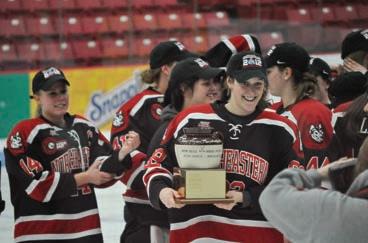
TD Garden holds 17,500 seats, whereas Matthews Arena, where the women’s final was played, holds 4,500.
It is possible that the men’s Beanpot attracts more attendees than the women’s
competition, but I don’t fault the women nor should that be a reason that they should not play at the Garden.
It is the responsibility of the schools and the wider Boston sports community to advertise and treat women’s sports equally to men.
Perhaps the Bruins, who clearly care about the advancement of women’s hockey since they are in partnership with the Boston Pride, should speak out.
The Beanpot is one of the biggest stages in the greater Boston area college sports teams; the women of Harvard, BU, BC, and Northeastern deserve to play on its biggest stage: TD Garden.
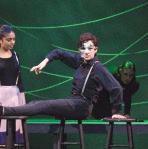
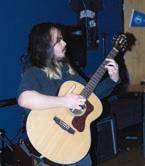




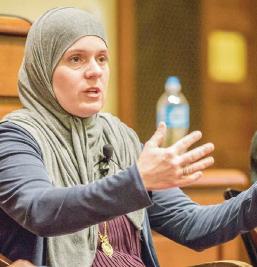


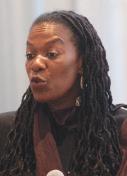



CONTINUED FROM 16

conflict. No Russian or Belarusian national teams can participate in international or zone competitions, e.g. FIA Motorsport Games, until further notice. The Russian and Belarusian drivers, individual competitors, and officials can only participate in international and zone competitions and under the FIA flag.
On March 5, the Haas team finally put out a statement claiming they have dropped the Russian driver Nikita Mazepin, despite the rule previously mentioned. The statement declared that no Russian or Belarusian national symbols, colors, or flags should be
displayed on uniforms, equipment, or cars, and that Russian and Belarusian anthems should not be played at international or zone competitions. FIA representatives from Russia and Belarus have been ordered to step aside temporarily from their roles. Also, no FIA grant will be awarded to the Russian or Belarusian FIA Members, and no existing FIA grant funding will be paid to the Russian or Belarusian FIA members. Lastly, upon the proposal of the F1 Commercial Rights Holder, the 2022 Russian F1 Grand Prix will be canceled for reasons of force majeure. In this case force majeure means unforeseeable circumstances that prevent someone from fulfilling a contract.

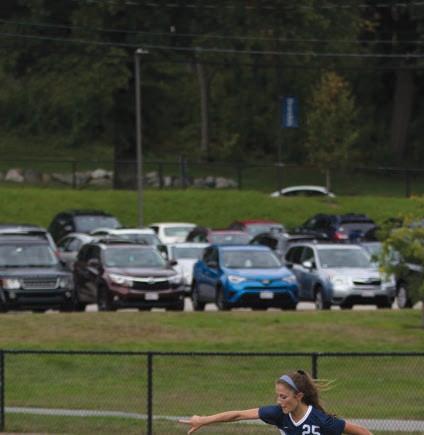
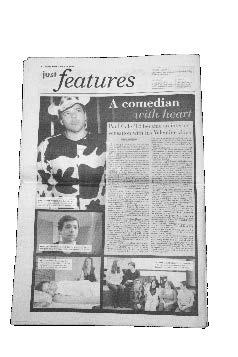

innings pitched.
UPCOMING GAMES:
WOMEN’S SINGLES RECORD
Zhang 6-0, 6-0
WOMEN’S DOUBLES RECORD Quinn / Howe 8-4
UPCOMING MEETS:
Men: March 13 at Colby
Women: March 11 at Bentley
At Brandeis, Quidditch is one of the various club sports found on campus. This week, the Justice had the chance to talk to some members of the Quidditch Team to hear about their club and their hopes for the upcoming semester.
According to US Quidditch, the sport of Quidditch was founded in 2005 at Middlebury College. This sport was inspired by the Harry Potter book series, whose first book was published in June 2003. Over the years, Quidditch has grown into an international sport.

At Brandeis, Quidditch is open to everyone. In an interview with the Justice, Co-Captain Vidisha Jha ’23 explained that “Quidditch is a mixed-gender, full-contact sport that draws from elements of other games to create a unique and eclectic mix that’s a whole lot of
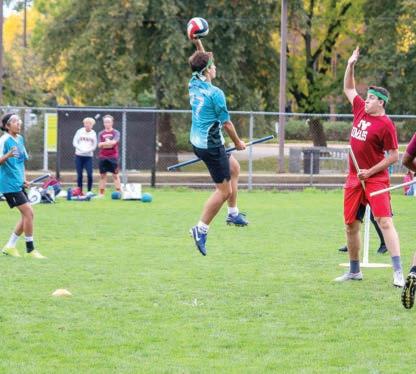
fun!” Practices are on Tuesdays and Thursdays from 8 p.m. to 10 p.m. and Sundays from 3 p.m. to 5 p.m. The team looks for new members of any level of experience and has welcomed students from various varsity teams as well as those who have never learned to throw or catch a ball. When asked about the prior experience of team members, Jha explained, “We’re ready to meet everyone at their level of athletic ability and make sure they can have a fun, safe experience learning the game.”
Currently made up of 15 members, the team competes at the national level under the national body known as US Quidditch and participates locally in the Massachusetts Quidditch Conference. Being a part of this conference means that the Brandeis Quidditch team regularly plays other schools from New York, Rhode Island, and Vermont. Upcoming home tournaments are scheduled for March 12, 19, and 26. At the end of April, the team plans to travel to Utah for the US Quidditch Cup. The Brandeis team stands firm on their belief in making Quidditch
a gender-inclusive sport. Jha explained, “Here at Brandeis, and beyond in the national Quidditch community, we stand with trans athletes and believe in their right to be affirmed in their genders and their place on sports teams simultaneously. Because of this and a general desire to be recognized as an independent sport, the American Quidditch community is currently in the process of renaming the sport to divorce us from the reputation of J.K. Rowling and any trademarks owned by her or Warner Bros. While the new name has yet to be announced, I’m personally excited to see the new direction that Quidditch takes as we gain traction under new branding.”
The overall feel of the Brandeis Quidditch team is a fun and warm community full of people with all different levels of athleticism who have created a welcoming, inclusive club sport experience. Like many other club sports teams who the Justice has spoken to, Brandeis Quidditch team members enjoy participating in their sport for both the love of the game as well as the people that they meet.
■ The Justice takes a look into the Quidditch Club at Brandeis.Photo Courtesy of QUIDDITCH CLUB SKY-HIGH : Quidditch Club member attempts to score over tough defense.
■ With a rise in minutes on the turf, Chelsea's Christian Pulisic makes an impact.
By AKI YAMAGUCHI JUSTICE STAFF WRITERWith Chelsea Football Club splashing out nearly £60 million on the young American star Christian Pulisic three years ago, the news was abuzz on the kind of impact he could bring to the team. Nicknamed “Captain America” for his leadership within the U.S. National Men’s team, there are high standards set for the 23-year-old and his future. After persistent injuries since the 2019-20 season, he is back strong and proving to Chelsea Manager Thomas Tuchel that he deserves the minutes and a more consistent starting role.
Chelsea FC has been rotating their starting lineup between their offensive players like Mason Mount, Kai Havertz, Hakim Ziyech, Jorginho, and Romelo Lukaku. Despite starts by Pulisic, he had dropped off in minutes at his favored position on the wing and had started to be pulled back by Tuchel. However, it is clear that Tuchel is starting to recognize the effectiveness of his position attacking from the left up top, and the spot has become more consistent for Pulisic. In the
recent league game against Burnley, Chelsea capped off the week with a 4-0 win, with Pulisic scoring the closing goal. With a method finish, the ball of a frantic clearance from the opposing defense had landed at his feet for him to put in the back of the net. Furthermore, Pulisic’s presence in the second half was clear when he started the offensive play of the second goal, with a fantastic cross to N’Golo Kante before the cross to Havertz who put it away with a header. Leading the team with most duels won — 10 — and tackles won— two — his contributions in the final third paved the way for another start with the upcoming games.
With Chelsea’s match against Norwich City on Thursday, it is still yet to be seen if Pulisic will be able to earn a consecutive start. It’s clear the combination of Pulisic, Havertz, and Mount is proving strong, and Tuchel will have a lot to think about as the game nears. If Pulisic can keep up the offensive switches across the field on top of his finishing ability in the box, it’s clear that he will become a more consistent contributor for Chelsea. As the 2022 FIFA World Cup qualifiers continue to play out, Captain America’s skill abroad will bring an important presence to a much anticipated and hopeful qualification for the U.S. Men’s National Team after a failure four years ago.
■ The FIA condemns Russia by implementing new legislation to dismiss all things Russian in F1.
By LIZ PAL JUSTICE CONTRIBUTING WRITERThis upcoming Formula 1 season will see several large changes to the sport. First, there have been new rules implemented for the 2022 season. According to Sky Sports, the three main changes are the implementation of a groundeffect floor, simplified aero components, and 18-inch tires with wheel winglets. The ground-effect, a concept which was popular back in the 1970s, causes a suction effect between the car and the tarmac which provides downforce—a downwards force that allows cars to move faster—without the drag that is caused by rear and front wings. Simplified front wings are responsible for narrowing air flow and decreasing the effectiveness of the Drag Reduction System. DRS is a system that opens the rear wing on straights to encourage overtaking, i.e. passing other cars on the track. The new front wing not only changes airflow but also improves the visual aesthetic of the vehicles. Lastly, the new tires should allow drivers to have better control of their cars while racing. The new rules have been said to “even the playing field,” according to many drivers on the grid.
On Feb. 25, 10 teams had the opportunity to put their cars to the

The fictional sport makes its way to Brandeis' campus in the form of the Brandeis Quidditch Club, p. 15.

test on the Circuit de BarcelonaCatalunya in Barcelona, Spain.
Planet F1 reports that the fastest lap was set by Lewis Hamilton and Mercedes. The seven-time world champion laid down 184 laps with his fastest lap time being 1:19.138. Red Bull and Max Verstappen claim that they are not currently racing for time and the team plans on displaying their true ability during the first race of the season in Bahrain on March 20.
Due to the recent conflict with Ukraine, Russia has been condemned by the Fédération Internationale de l'Automobile who has decided to strip the Russian Grand Prix from the 2022 F1 calendar. FIA President Mohammed bin Sulayem spoke out, saying, “As you know, the FIA is watching the developments in Ukraine with sadness and shock and I hope for a swift and peaceful resolution to the present situation.” The FIA later released a full statement with the new policies they have implemented. The following is a list of the main policy changes outlined in the statement: No international/ zone competitions are to take place in Russia and Belarus until further notice. No flag, symbol, or anthem of Russia or Belarus will be used in international or zone competitions until further notice. The Haas car has since been repainted in order to remove the white, blue, and red—the colors of the Russian flag—on their car’s front wings. Uralkali, a Russian company, has also been dropped by the HAAS team due to the
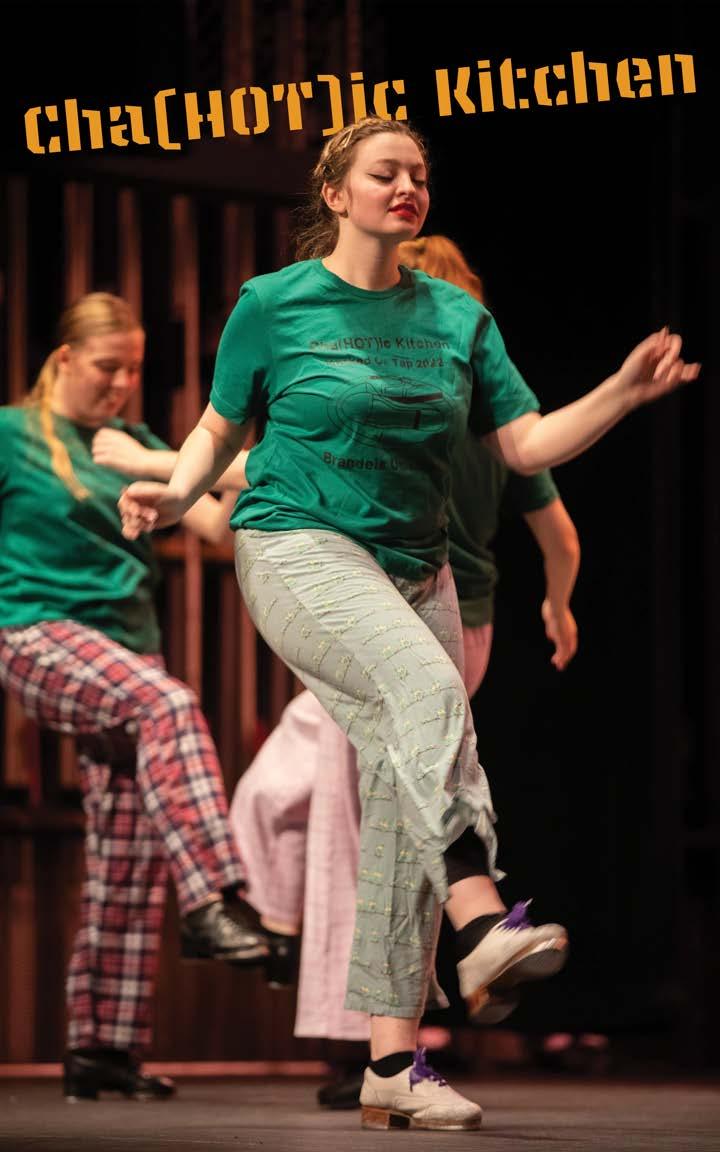

 By MINA ROWLAND JUSTICE CONTRIBUTING WRITER
By MINA ROWLAND JUSTICE CONTRIBUTING WRITER
**Spoilers ahead for those who have not seen the film. Song references are in parentheticals.**
A fair number of us know and remember well the power of Disney magic from pixie dust to “Pocahontas.” I grew up with classics like “Beauty and The Beast,” “The Lion King,” and “Bambi,” but as a child I did not have a lot of interest in watching Disney, which is quite a shock considering how obsessed I am now. I rarely watched Disney after their early films. Regardless, when “Encanto” came out, the world was obsessed (if you have met me, I know I am not alone in my obsessions).
When the trailer first came out I knew I was going to like it — I promise you it is not because I love “Hamilton,” “Moana,” and “In the Heights.” The first reason was the main character had such a unique name, Mirabel: a name that my sister happens to share. Secondly, the animation at Disney is so stunning (I can see peach fuzz on Luisa’s neck), and the emotions we can see in each character gives them a layer of realism that has not necessarily been present in other movies. Last but not least, the story line is so closely connected to family and does not follow the typical Disney story arc. As we have seen with Disney’s last few films, the main character has on inner conflict (with ice powers, a love for water, or an obsession with dragons) and focuses less on a love interest.

“Encanto” is no different. I, a theater kid and an art nerd, thoroughly enjoyed every aspect of the film. The story follows a multigenerational family called the Madrigals, where all the family members have magical gifts that allow them to help their community by way of a magical candle.
Unfortunately, Mirabel is the “only Madrigal kid with no gift,” though I would argue she does have a gift — we’ll get back to that later. The movie is set near the 20th century in Colombia after a war, and the encanto, Spanish for
“charmed or enchanted,” is a sacred and protected land between two mountains, which Abuela describes as “a refuge” and “a place of wonder.” The family consists of Alma, also known as “Abuela,” who has triplets: Julieta, whose power is cooking that heals, Bruno, who can see into the future, and Pepa, who can control the weather.
Julieta married Agistín, who has no gift. Their daughters are Mirabel, who seemingly has no gift, Luisa, who has super strength, and Isabela, who has phytokinesis: the ability to control plants. Pepa married Félix, and their children are Dolores, who has super hearing, Camilo, who can shapeshift, and their youngest Antonio, who gets his zoolingualism gift during the film, which allows him the ability to communicate with animals. The song, “The Family Madrigal,” does a better job describing the family and their talents.
Over the course of the film, the magic of the encanto starts to falter and Abuela blames Mirabel, who is not at fault. Mirabel resolves to fix the magic on her own. She talks to her siblings only to discover that everyone is equally as miserable even though they have powers — Luisa is on the verge of breaking from too much pressure, and Isabela fears she’ll never be perfect enough. Mirabel eventually asks the big question ‘What’s up with Bruno?’, leading to the song “We Don’t Talk About Bruno,” which is at the top of the U.S. music charts. She finally finds him, only to discover he has been hiding in the walls of the house the entire time. She questions Bruno and he explains he left because his visions already led to him being ostracized and he wanted to protect her since the last vision showed her in the middle of the Casita, the house’s name falling apart. He couldn’t tell if she was causing the cracks or not because his vision was out of order.
After much convincing from Mirabel and extra help from Antonio, Bruno agrees to have another vision where he sees that Mirabel must make amends with her sister
Isabela and hug. She seems irritated at first, exclaiming “Issa-bela!”, but accepts nonetheless. She tries to talk to Isabela and quickly get to the hug, but Isabela is furious that she ruined her engagement. Nonetheless, she realizes that she never wanted to get married in the first place. After Isabela confesses her disdain for perfection both sisters see casita healing itself. Immediately after, they rebuild a strong sisterly camaraderie (in song form, of course; “What Else Can I Do?”) between Mirabel and Isabela. Immediately after, Abuela and Mirabel get into a fight about who is really at fault. Mirabel defends herself, standing up to Abuela for the first time. But Abuela is persistent and blames Luisa for losing her strength, Isabela’s ruined proposal and Casita’s cracks. Abuela is blinded by everyone’s gifts and feels that everything must be perfect. During their argument, the cracks reappear and grow larger. It seems that Abuela is never satisfied, and the house eventually collapses. Everyone is trying to escape the house, while Mirabel is trying to save the candle. She grabs the candle, only for it to go out despite her attempts to save the flame. Casita protects her as the rest of the house crumbles. Mirabel quietly leaves and finds solace at a river, where she and Abuelatalk about the past and why she felt the need for everyone to be perfect. They embrace as well and she realizes that the gift is not the candle or their talent, but family.
“Encanto” breaks so many stereotypes. The level of diversity is empowering to see on screen, especially in animated form. The casting choices included many newcomers in the field of acting and a talented group that allows for authentic cultural representation. Within the animation, a
broad range of diversity is showcased from skin tone to different body types.
In the last few scenes, we see the Madrigal family and their community help them rebuild their home and their relationships.
Most importantly, when Mirabel touches the door handle for the Madrigal house, not only is everything restored, but she is officially given her gift: she can control the house and will follow in Abuela’s footsteps. This is just a theory of course, but she is the only one who openly communicates with Casita, and it seems she would be the next leader of her family. After everyone enters Casita, each character lets go of the expectations of perfec-
tion and is comfortable being their true selves. Luisa takes a much needed break, Pepa happily dances under her hail flurries, and Isabela cheerfully uses her power to make plants of all varieties. In the very last shot we see the perfectly imperfect family all together and genuinely happy.
Overall the film presents some important themes such as family, trauma, and the importance of love from family, with a specific focus on exploring different family dynamics rather than focusing on just one type of love. The film simply tells a story about a family in need of spiritual healing. “Encanto,” like the Madrigals, is a sweet, charming, and magical experience.
ABC’s “Abbott Elementary” is currently on a break, which means it’s the perfect time to catch up with the first exciting network sitcom in years.
Part of the excitement is simply based on ratings. The second episode of “Abbott Elementary” brought in the highest ratings for a network sitcom since the “Modern Family” finale, which is in itself a feat. Network TV has been falling in ratings since the streaming era began, so to see a sitcom become a legitimate hit in its first season, without any stars and without being a spinoff, is a shock.
The other half of the excitement, and the part that’s more important here, is the quality of “Abbott Elementary.”
The show is set in the Philadelphia public school system and follows teachers as they attempt to navigate their lack of budget, unruly kids, and personal relationships. It’s a classic example of the workplace sitcom, a genre that reached a creative peak in the 2000s and 2010s with shows like
the American version of “The Office,” “30 Rock,” and “Parks and Recreation.”
“Abbott Elementary” is indebted to many of those shows creatively (like “The Office” and “Parks and Rec,” it’s done in a mockumentary style), but it manages to update and expand the genre in exciting ways creatively.
The creator and star is Quinta Brunson, who first achieved fame comedically on the internet through viral videos and her work at Buzzfeed. The big change she makes to the format of the network workplace sitcom is to focus “Abbott Elementary” squarely on systemic issues that the Philadelphia school system faces today. Philadelphia feels like a real city in “Abbott,” one whose situation Brunson and her writers are directly drawing on and discussing. Whereas “Parks and Rec”’s version of Pawnee felt like a parody of the Midwest, and “The Office” was only nominally set in Scranton, “Abbott” draws its comedy from issues like the lack of funding that Philadelphia teachers receive, and gains real perspective because of it. That perspective makes the show feel
fresher than its recently staid genre would typically allow.
The other big change to the workplace sitcom is, to be blunt about it, that the cast is predominately Black. Though high-quality network sitcoms centered on Black families have existed since the ‘70s, fewer workplace comedies about Black workplaces have been greenlit at this level. That would be exciting enough, but what’s even better is that Brunson uses this to her full advantage creatively: writing plots about step teams, including a well-meaning but often clueless white teacher who can be made fun of, and allowing Black characters the full breadth of the sitcom archetypes. But beyond just perspective and casting, it’s important that “Abbott Elementary” is the one thing any sitcom needs to be: really, really funny. The standout in the cast is Janelle James, who plays Ava, the school’s principal. She is an unhinged diva of the Jenna Maroney variety, but now with legitimate power, which makes her even funnier.
Sheryl Lee Ralph continues to cement her icon status as Barbara, one of the more
seasoned teachers at “Abbott.” In other hands, Barbara could be a bore, as a full-blown professional who is rarely thrown off her game is not classic sitcom fodder. But, instead of playing the straight man, Ralph finds just as much fun in her characterization as the other cast members, managing to create infinite versions of a closelipped smile for any situation, all of them funny. And, when she is occasionally called on to be in the wrong, she’s all the funnier for it.
Brunson is the lead of the show as Janine, a permanently optimistic new-ish teacher who constantly pushes forward despite just as constant setbacks. Brunson has done fantastic work quickly defining Janine’s relationships in the show with each of the other leads: she’s in a classic will-theywon’t-they relationship with Tyler James Williams’ stick-in-themud substitute teacher Gregory; she sees Barbara as a mother figure despite Barbara’s general apathy toward her; she is in an antagonistic relationship with the carefree Ava, etc. Those clearly defined and wide-reaching relationships are a necessity for any sitcom that wishes to run for an extended period, which “Abbott”
is surely aiming for.
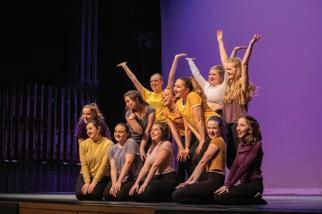
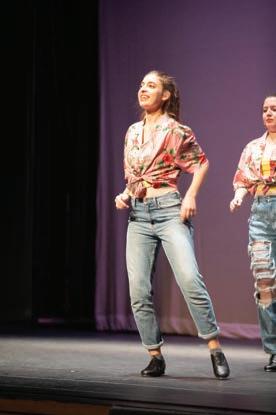
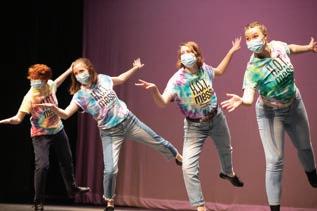
If there’s a critique to be made of the show, it’s that it is occasionally too indebted to classic sitcom beats. While the will-theywon’t-they is a classic, enjoyable plot, it is, as of now, the only extended arc of the season. While sticking to self-contained plots used to be sitcom standard, “Abbott” is likely to be consumed moving forward by streaming audiences, even if it didn’t originate there, and streaming necessitates extended plots to keep audience interest. It’s likely that Brunson and her writers put these plots aside in order to have time to sketch their characters, but the constant same-ness of the format can become difficult. “Abbott”’s inspirations in the mockumentary style mined extended plots for both emotional and comedy gold as they progressed, and “Abbott” will be all the better when it starts doing the same.
Ultimately, though, this critique is not cause for concern. “Abbott Elementary” is smart enough, original enough, and funny enough to hold your interest through its breezy nine episode run. When it comes back, I’d make sure you’re watching.

Cancer
Aries
Take it easy this week, Aries! Mercury, the communication planet, is exiting Aquarius and entering Pisces in your twelfth house, which rules dreams, emotions, and secrets on March 9, meaning your emotions, dreams, etc. might be glossed-over. Take the time to allow yourself to rest and recharge during this time, as clear, concise communication may be hard to come by. Also, Thursday is a quarter moon in Gemini; this can provide some emotional insight for you this week. If you are worried or unsure about something, this could be the time to reconsider, and perhaps things will be illuminated for you! Don’t fret, Aries, your time is coming in just a few short weeks when the Sun enters Aries on March 20, and Mercury enters Aries on March 27!
Taurus
Teamwork is key this week for you! Mercury enters Pisces this week in your eleventh house, which governs social circles and your reception in society. Consider how you come off to people, and perhaps make some changes if anything doesn’t align with how you want to present yourself. First impressions are everything; make them count! Thursday’s quarter moon in Gemini in your second house of finances and values is really giving “it’s all about who you know” vibes. Take the time this week to remember that everyone you work with is a real person, and creating healthy professional relationships with those you work with can help you out of some really sticky situations in the future.
Gemini Mercury enters Pisces in your tenth house of ambition and success this Wednesday. While Mercury is in this sign, you will have opportunities to show your skills and step into the role of leader, if that’s what you want. Remember that showing your unique skills and personality can get you where you want to go in the future, so it is never a bad idea to take the reins on a project you know you can succeed on. Thursday’s quarter moon in Gemini can help clear up any unsure emotions you may be feeling this week. Reflect on your behavior, and ask yourself what you really want to put out into the world, and if you are currently doing so.
Planning a trip sometime soon? Mercury enters dreamy Pisces in your ninth house of travel and adventure this Thursday!

If you aren’t traveling this week, or are unable to do so, perhaps plan a vacation for later, especially when it gets warmer out. Even if it isn’t far, just exploring further in Waltham, or in the greater Boston area, could give you that “escape” feeling without needing to board a plane. With the quarter moon in Gemini this Thursday, keep an eye out for “coincidences,” signs, or symbols. This quarter moon lands in your twelfth house of feelings, dreams, and spirituality, so keep an eye out for any strange dreams you may have this week or strange coincidences, even if it’s just something as simple as two people recommending the same TV show.
Leo
This week you are a magnet, Leo! With communication planet Mercury entering Pisces in your eighth house of seduction, you will have no problems winning people over this week. This looks like a good thing, but keep an eye on who wants to move into your inner circle this week, keep energy around that aligns with your own, and don’t make exceptions. Thursday’s quarter moon in Gemini lands in your eleventh house of social circles and impressions! Reach out to those in your inner circle if you find yourself needing help this week, and be proactive. Know what you want and what you need, and don’t be afraid to ask for it if you know someone can help you.
Scorpio
The energy is rising in your life, Scorpio! Mercury moves from Aquarius to Pisces in your fifth house of creativity and romance this Wednesday. Put in a little extra effort to celebrate this extra energy you have and wear that outfit you’ve been meaning to wear but haven’t gotten around to yet!
Allow this creativity and energy to take over this week and you might be pleasantly surprised what you get yourself into. Keep an eye out this week with the quarter moon in Gemini in your controlling eighth house on Thursday – it might bring to light some consequences of your previous actions. Give yourself an opportunity to see these consequences and correct them if needed.
Virgo
Love is in the air this week! With Mercury entering Pisces in your seventh house of partnership, communication is key in any partnership or relationship for you this week. Even if you are not currently in a relationship, any partnership applies to this, like a best friend or even just a work partner. Make sure you communicate clearly and effectively this week: you don’t want anything getting mixed up in translation! If you have been holding something back from someone, this might be the time to open up to them. Thursday’s quarter moon in Gemini lands in your tenth house of social status and your career. Take some time this week to think about your career plan, and maybe make an appointment at Hiatt or academic advising to see if you are on track for your goals!
Libra
After Mercury exits your creative fifth house and enters Pisces in your sixth house of organization and well-being this Wednesday, it is time to focus! Make sure you are taking care of yourself (a little self-care never hurt anyone and consider how stress affects your life). Maybe keep track of habits that may not be helping your general well-being looking at your screen time can help, even if it provides some harsh truths. This Thursday, the quarter moon in Gemini lands in your ninth house of travel and philosophy. Open yourself up to some more imaginative thinking this week; it might lead you down some paths you never would have taken before!
After your energetic start to the year, you might be taken down a notch or two with Mercury entering Pisces in your fourth house of family and home this Wednesday. This can change your focus inward onto yourself, your familial relationships, and your living situation. This doesn’t necessarily mean you need to isolate yourself, though, so take the time to reach out to your family or roommates and spend some quality time with them! This also comes into play on Thursday when the quarter moon falls into Gemini in your seventh house of partnership. Take the time to ask for help when you need it, and consider what you value in a partner this week.
Capricorn
Energy is through the roof this week as Mercury enters Pisces in your third house of communication and transportation! With the warmer weather in store for this week, you may find a plethora of opportunities to go out and enjoy this change. Look around for opportunities to go out of your comfort zone! Remember, the third house is also the communication center and with Mercury the communication planet in this house, you are the communication master this week. If you have an essay or writing assignment you’ve been avoiding, this may be the time to start on that. Thursday’s quarter moon in Gemini may give you that extra push that you need as well, as this quarter moon falls in your sixth house of organization. Make sure you don’t put too much on your plate, though!
Consider your priorities this week, as Mercury enters Pisces in your second house of money and securities on Wednesday! Analytical Mercury can help you take hold of your finances and budget if you had maybe started this year off a little too excited. Consider your spending this week, keep track of any unnecessary spending –this would be the opportunity to get that under control. The upcoming quarter moon in Gemini in your fifth house of relationships on Thursday can help you turn your attention onto a special person in your life! Consider what relationships align with your needs and those that don’t this week. Plan for your future, and carefully consider who you want in your future, and who you don’t.
Pisces
How has Pisces season been treating you thus far? It is about to get even better as Mercury, the communication planet, enters your sign of Pisces this Wednesday in your first house of self! Definitely don’t waste any of this extra energy, take this opportunity to enjoy it, and be the main character of your own story this season! Don’t second guess yourself this week, and be confident in your decisions and ideas. There will be obstacles along the way this season, but isn’t there always? You have the power to jump over the hurdles and truly succeed this week! Thursday’s quarter moon in Gemini in your fourth house of family and home might force you to slow down a bit at the end of this week. Take this time to practice some self care, call your family, or redecorate your room!